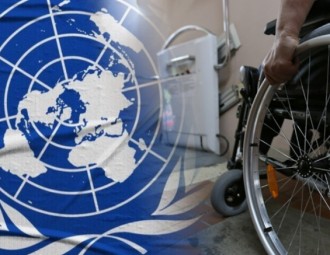Office for the Rights of Persons with Disabilities together with EuroBelarus launches a new campaign

The campaign called “Agenda 50” is aimed at helping to realize the Convention on the rights of persons with disabilities in the regions.
Office for the Rights of Persons with Disabilities launches a new campaign “Agenda 50”. It has been planned and will be realized together with the international consortium “EuroBelarus”, Center for European Transformation, TUS (Poland), and NGO “European house” (Denmark).
Implementation of the Convention’s main principles and decision making on disability issues in local communities are the campaign’s main goals.
- The campaign will be aimed at achieving practical results, in particular – at embodiment of the Convention’s principles in real practical steps in minimum 5 pilot local communities, – explains the director of the Office Enira Bronitskaja.
Convention on the rights of persons with disabilities signed by Belarus on September 28, 2015 can and should become a platform for progress in solving disability issues. Although we should admit that the formal signing of the international treaty can’t solve all the issues. Only deep understanding and accepting of the Convention’s idea, its implementation at the level of everyday practices and common life can significantly influence the development of public relations. Formal declaration about accepting the Convention at the national level is not enough. All possible work on implementation of high standards in everyday reality is needed and not only by means of the law but at practical level.
The experience gained by European countries during the implementation of the Standard rules on the Equalization of Opportunities showed the necessity to make efforts in the sphere of introducing the equalization of opportunities starting from the level of local communities. So in Sweden and later in many other European countries efforts have been made to introduce progressive norms solving disability issues. This movement was named “Agenda 22”, what means literally 22 points (22 – the number of points of Standard rules for realization) of interpretation of high standards of the international treaty for a specific local community – district, city, town. And what is especially important – these agendas were prepared by the local communities what gave a possibility to make them realistic and effective.
According to the Office’s specialists today Belarus is in the same situation. It is necessary to introduce an innovation paradigm of disability understanding and also to change laws and existing practices and what is the most important – relation to disability in the society and it needs a responsible and strategic approach.
- We see the experience of preparation of local communities agendas as a very useful one, – says the coordinator of the Office for the Rights of Persons with Disabilities Siarhei Drazdouski. – The Convention consists of 50 articles and understanding and realization of each one of them at the level of local community in the form of “Agenda 50” can become a qualitative way of changes. Explanation of every article taking into account local peculiarities and possibilities will give a possibility to transform the Convention from a legal document to an understandable and applied in common life practical form.
-
03.01
-
07.10
-
22.09
-
17.08
-
12.08
-
30.09



























